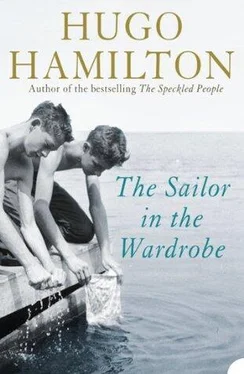Then I heard a shout coming from the shore.
‘Turley.’
His name, nothing more. I looked to see if he had heard it too. Along the top of the rocks there was somebody standing with the advantage of the sun behind him, but we could see nothing and the shout could have come from any of the caves along the coast that looked like open mouths. It could have come from the small stone ruin or from any of the dark windows of a derelict house on the cliff. It was just the one shout, no more. Somebody who knew him. A hostile call that hung in the air over the water and would not go away, as if somebody wanted him to know that he was being watched and that they had not forgotten, that’s all.
I know there is no place to hide from your memory and no place to hide from your own name. It will come after you, following you down the street, on the bus, even out in the boat. Your own name following you like a curse. Packer told me that Dan Turley comes from Derry and that he’s got enemies, but we don’t know much more than that because he never talks about himself. He’s the man who never looks back, the man who wants to forget his own name and where he came from, like me.
My father and mother taught us how to forget and how to remember. My father still makes speeches at the breakfast table and my mother still cuts out pictures and articles from the newspapers to put into her diary when she has time. She wants to make sure that we remember how we grew up and don’t repeat what happened to her in Germany. She wants everything to be fixed and glued into her book. Our history and the history of the world all mixed together. There is a lock of blond hair on one page and a picture of Martin Luther King on the next. School reports and pictures of tanks on the streets of Prague facing each other.
Whenever we had nightmares in our family, she would get up in the middle of the night to take out a piece of paper and coloured pencils. Here, draw the nightmare, she would say. Once you put it down on paper, you will never have to dream about it again. So we would sit up in bed with the light on, rubbing our eyes and drawing whatever it was that frightened us. Sometimes I couldn’t remember what the nightmare was. My fingers were so weak with sleep that I couldn’t even hold the pencil or push it down onto the paper. But she would wait patiently with her arm around me, until the bad thing was drawn and coloured in. Look, she would then say, it’s there in your drawing and we can put it away. Now we have un-remembered it and we can go back to sleep again.
Our family is a factory of remembering and forgetting. My mother’s diary is full of secrets and nightmares. There’s a drawing by my sister Maria of a wolf with green teeth preventing her from getting down to my mother at the bottom of the stairs. There’s a picture of my brother Franz in one window of the house and everybody else in separate windows of the same house, unable to speak to each other or hear each other calling, because each room has a different colour and a different language. There’s a picture of a river coming through the front door with lots of people that we don’t know on boats sailing along the hall, speaking English. There were nightmares in Irish and nightmares in German. Nightmares in English that could only be drawn without words. Family nightmares and world nightmares. I once drew the picture of a Jewish man who had his beard ripped off and his chin was all red, because my mother told me that story and I couldn’t stop thinking about it. There’s a drawing of Roger Casement being buried in Glasnevin. Another drawing of the Berlin wall and people trying to escape through the windows of their houses, throwing their suitcases and their children down first.
Sometimes we had to draw the nightmare and also the solution. Maria at the bottom of the stairs in my mother’s arms, and the wolf locked in the bathroom. My sister Bríd standing at the window getting lots of good blue air into her lungs instead of bad red air. Nightmares about my mother not being in the same country as us. At one time, my drawings were all full of pigs and chickens and farmers facing in one direction. All the smoke and all the flags were flying to the left until one night, when my mother discovered that she was the only person looking the other way, to the right. She told me to turn her around and then everything was fine, with all of us facing in the same direction, all in the same country again.
There were so many nightmares in our house that my mother must have been up all night sometimes. As soon as one bad thing was down on paper, something new would get into our heads. The more we drew our nightmares, the more we made up new ones. There are night drawings of skeletons, snakes, spiders, lions, walls with eyes, doors with teeth, stairs with massive earthquake cracks opening up on our way to bed. We used up every monster there was, my mother says, and there could hardly be any more nightmares left for us, but still we invented more. And downstairs at night, I know my father and mother were busy with their own nightmares. My father in the front room trying to write articles for the papers and thinking of new inventions that would make Ireland a better place. My mother in the kitchen at the back, putting her German secrets into her diary along with ours.
It was the nightmare factory. Other families were obsessed with sport, or music, or practising Irish dancing. We grew up dreaming about things that happened and things that had not happened yet and things we wished had never happened. By drawing everything down on paper, we developed a special talent for inventing fears and nightmares. We became the nightmare artists.
At some point we all started dreaming fire. A timber yard went up in flames in Dublin one night and you could see the firemen on ladders directing the water across the walls. An oil tanker on fire and the whole sea covered in flames. Trees on fire in Vietnam. Blazing cars in Northern Ireland. A man named Jan Palach set himself on fire on Wenceslas Square in Prague. My mother remembered seeing lots of things on fire with her own eyes in Germany during the war. She remembered the synagogue in Kempen on fire and no firemen helping to put it out. So then it was drawings of buildings on fire, prams on fire, a doll’s house on fire. Now it’s buses burning in Belfast and you think there’s almost no point in fixing anything down on paper any more, because it keeps coming back again and again on the TV every night, right in front of your eyes.
All over the world, there is trouble on the streets now and trouble inside the houses. Civil rights demonstrations. People marching with placards and throwing stones at the police. At dinner, my father slaps his hand on the table and says things are changing in Northern Ireland at last, things that were left unfinished for years. He points at the TV and says he can’t wait for the future when things will be just like they were in the old days before the British.
You can see them throwing stones and petrol bombs at the police. Everybody talking about a place called the Bogside in Derry where the police were firing tear gas at the people in the street and you saw the crowd of protesters, some of them like cowboys with handkerchiefs over their mouths and noses, picking up the gas canisters and throwing them back. My father says it must be against the Geneva convention to use CS gas on people in the street, where there could be children and old people nearby with bad chests and lung conditions. At the battle of the Bogside, you saw them throwing petrol bombs down from the roof of the flats. The people of Derry were winning because the women start factories of petrol bombs and there was an endless supply that kept raining down onto the police. You saw a policeman on fire, screaming and kicking the flames away off his legs. Other policemen coming to help him, beating the fire off with their shields. Eventually the police lost the battle and the British army was called in. My father said the picture was complete now with the four allies from the Second World War still doing the same thing, as if they could not get out of the habit. It was French troops in Algeria, Russian troops in Prague, American troops in Vietnam, and now the British troops in Northern Ireland. We heard Jack Lynch saying that we could no longer stand idly by and watch Irish people getting hurt again. I even made a petrol bomb myself one day, because I was working in a garage at the time. But then I had nothing much to throw it at, so I just lit it and watched the earth on fire in the lane at the back.
Читать дальше
Конец ознакомительного отрывка
Купить книгу












